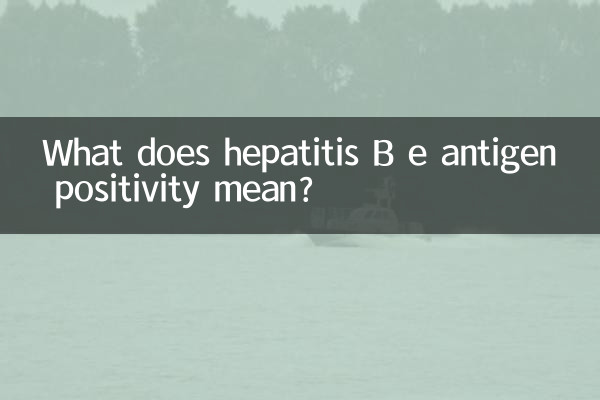What does hepatitis B e antigen positivity mean?
Hepatitis B e antigen (HBeAg) is a signature protein in the replication process of hepatitis B virus (HBV). Its positive result usually indicates that the virus is actively replicating and is highly contagious. Understanding the significance of HBeAg positivity is crucial to the diagnosis, treatment and prognosis assessment of hepatitis B patients. This article will combine the hot medical topics on the Internet in the past 10 days to provide a structured analysis of the clinical significance and related data of HBeAg positivity.
1. Basic concepts of hepatitis B e-antigen positivity

HBeAg positivity usually appears in the early or active stage of hepatitis B virus infection, and its presence indicates:
| index | clinical significance |
|---|---|
| HBeAg positive | The virus replicates actively and is highly contagious |
| HBV-DNA high capacity | Usually >10^5 IU/mL |
| ALT level | Possibly elevated (sign of liver inflammation) |
2. Recent hot topics
According to hot discussions in the medical and health field in the past 10 days, the following topics are closely related to HBeAg positivity:
| hot topics | Relevance statement |
|---|---|
| Progress in new drugs for functional cure of hepatitis B | Clinical trial data update for HBeAg-positive patients |
| Increased success rate of mother-to-child interruption | Optimization of intervention programs for HBeAg-positive pregnant women |
| Controversy over immune tolerance period management | Treatment timing for HBeAg-positive patients with normal ALT |
3. Clinical classification of HBeAg positivity
According to the latest "Guidelines for the Prevention and Treatment of Chronic Hepatitis B", HBeAg-positive patients can be divided into three clinical states:
| Types | feature | Proportion |
|---|---|---|
| immune tolerance period | ALT is normal, HBV-DNA>10^7 IU/mL | about 30% |
| immune activity period | Elevated ALT, HBV-DNA>10^4 IU/mL | about 45% |
| Inactive carry status | ALT is normal, HBV-DNA<2000 IU/mL | about 25% |
4. Treatment Strategies and Hot Research
Current treatments for HBeAg-positive patients mainly include antiviral drugs and immunomodulatory therapy:
| treatment plan | Representative medicine | HBeAg negative conversion rate |
|---|---|---|
| Nucleoside(acid)analogs | Entecavir, tenofovir | About 30-40% in 3 years |
| pegylated interferon | Peg-IFNα | About 25-30% in 1 year |
| combination therapy | Nucleoside analogues + interferon | About 50-60% in 5 years |
5. Answers to Frequently Asked Questions by Patients
Based on recent online consultation hot spots, we have sorted out the five issues that HBeAg-positive patients are most concerned about:
1.Will HBeAg positive become negative?
About 20-30% of infected adults can undergo spontaneous seroconversion, and the older they are, the higher the chance of conversion.
2.Need immediate treatment?
Comprehensive judgment needs to be combined with ALT, liver fibrosis and other indicators, and patients in the immune tolerance stage may not need treatment for the time being.
3.How contagious is it?
The blood HBV-DNA load of HBeAg-positive individuals is usually 100-1000 times higher than that of HBeAg-negative individuals.
4.Will it affect vaccination?
HBeAg positivity does not affect vaccination with other vaccines (such as the COVID-19 vaccine), but it is necessary to ensure stable liver function.
5.What should I pay attention to in my diet?
You should strictly abstain from alcohol, avoid high-fat diet, and supplement high-quality protein and vitamins in an appropriate amount.
6. Prevention and monitoring suggestions
Recommended monitoring frequency for HBeAg-positive people:
| Monitoring items | Recommended frequency |
|---|---|
| liver function | every 3-6 months |
| HBV-DNA | every 6 months |
| liver ultrasound | 1 time per year |
| alpha-fetoprotein | High-risk groups every 6 months |
By systematically understanding the clinical significance and latest research progress of HBeAg positivity, patients can cooperate with doctors in disease management more scientifically. It is recommended that all HBeAg-positive people go to a liver disease specialist for regular follow-up, and do not self-medicate or rely on folk remedies.

check the details

check the details